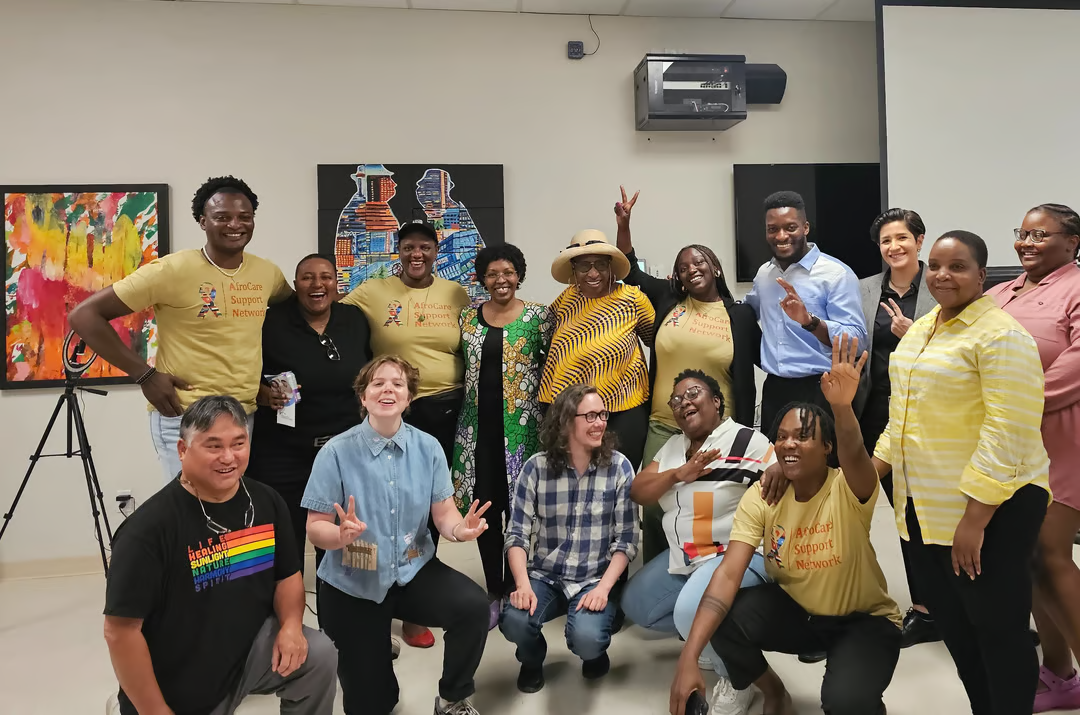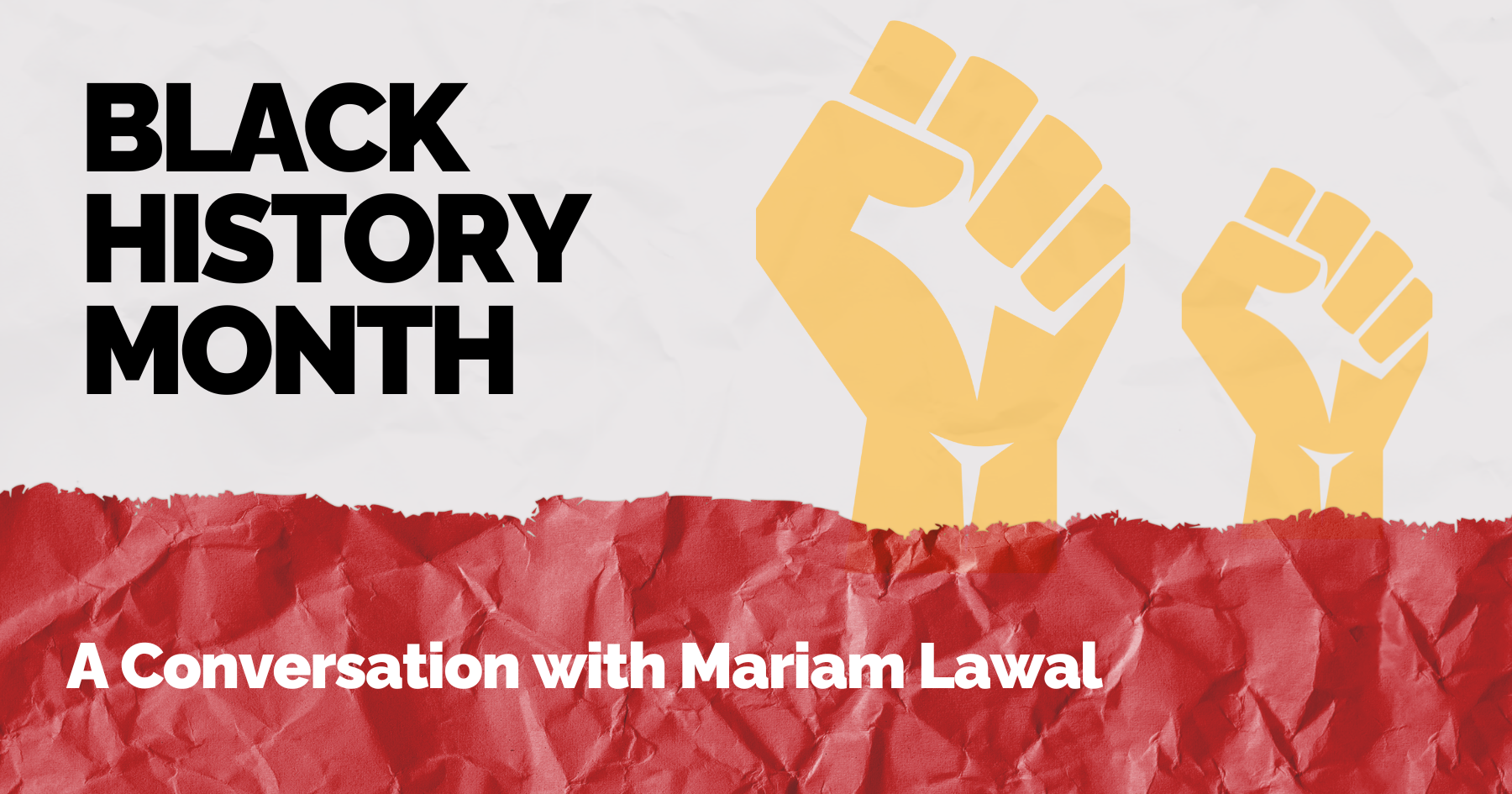Written by Alisha Ostberg and Edited by Oluwaseun Ayodeji Osowobi.
Table of Contents
Black History Month is more than a time for reflection; it is a call to action. It is a moment to recognize our strength and celebrate Black communities’ resilience. It is also a time to acknowledge progress, not just remembering struggles; they are important, but also our strengths, innovations, ideas, and contributions that have built Canada. For Mariam Lawal, founder of the AfroCare Support Network, Black History Month is an opportunity to continue the legacy of Black excellence.
“Black communities have always had to create their own support systems in the face of exclusion. We are carrying that torch forward. We are here because our ancestors fought for dignity, claimed their right to exist fully and refused to be silenced,” she says.
She believes community-led initiatives are essential in addressing systemic inequities, particularly in healthcare. This is why the AfroCare Support Network focuses on dismantling stigma and providing culturally relevant support to African, Caribbean, and Black (ACB) individuals living with HIV.
“That’s what Black History Month means to me. At AfroCare, we are part of this ongoing, you know, history. Ensuring that Black communities have access to stigma-free healthcare. Black history is not just something we acknowledge in February. It’s something we build every day. I believe our health, life and dignity matter all year round, not just in February.”
Mariam Lawal
The AfroCare Support Network: A Response to a Critical Gap in Services
Mariam’s journey into HIV advocacy began when she moved from Toronto to Calgary. Once here, she noticed a troubling gap in services for Black individuals living with HIV. In Toronto, she worked with several organizations, including serving on the board of Black CAP, where programs were designed with the ACB community in mind. But in Calgary, the landscape was different.
“I met people navigating their diagnosis alone. Yes, there are services, but they are not specific to their needs,” she recalls.
Mariam founded the AfroCare Support Network to fill that gap in services for Black people living with HIV. Most importantly, the organization provides a community while addressing stigma, misinformation, and systemic barriers that make it difficult for people to access care. It also provides education, advocacy, and culturally relevant support.
HIV and ACB Communities in Canada
HIV can affect anyone, no matter their age, sex, gender, sexual orientation, race, or ethnic origin. However, certain populations, particularly marginalized and racialized communities, bear a disproportionate burden of HIV in Canada due to structural and social factors that create health inequities.
While ACB individuals make up a significant percentage of new HIV diagnoses, there is currently no concise data on the total number of ACB people living with HIV in Calgary.
“These estimated numbers are more than just statistics,” Mariam says. “They reflect real people—people who struggle to access care, who are afraid of being judged, and who deserve so much better.”
Why Culturally Specific HIV Services Matter
Healthcare cannot be one-size-fits-all, especially when it comes to marginalized communities. The AfroCare Support Network and the Drumbeat Program recognize that HIV does not exist in isolation; it is tied to cultural beliefs, systemic inequities, and personal identity. When healthcare services do not reflect these realities, they lose trust.
“Culturally specific programs like AfroCare and the Drumbeat Program are not just helpful, they are life–saving,” Mariam explains. “When people see services designed with their cultural background in mind, it builds trust.”
Building that trust is essential in combating misinformation and stigma. In many ACB cultures, HIV is not seen just as a health condition; it’s a death sentence which deters people from seeking care.
“If someone is coming from a place where HIV is seen as a curse or a moral failure and has already given up on themselves, they will hesitate to seek care. That’s why culturally tailored services matter. We reframe the conversation, helping people unlearn harmful stigmas and replace them with truth.”

The Weight of Cultural Stigma
HIV stigma within ACB communities is entrenched. Since discussions around sex are often taboo, anything related to sexual health—especially HIV—becomes even more silenced.
“It’s not just an illness—it’s seen as evidence of wrongdoing,” Mariam says. “I have met people who would rather not know their status than risk the judgment of their community or the wrath of their self-judgement”
This stigma is so pervasive that even attending an educational event about HIV can lead to suspicion.
“If I create a flyer that says ‘HIV/AIDS Awareness Event’ and distribute it in the Black community, I will have zero attendees. People are afraid of being seen at an event like that because of the stigma attached to HIV. They think, ‘If I go, people will assume I have HIV.’ That’s how deeply ingrained this stigma is.”
The AfroCare Support Network and the Drumbeat Program have had to be strategic in reaching people. They approach conversations about HIV with care. Workers often have broader discussions about health to ease fears and make education more accessible.
Barriers to Healthcare: Systemic Racism and Distrust
Beyond stigma, ACB individuals face more barriers when accessing healthcare, including systemic racism and not enough culturally competent providers. Many Black individuals report feeling dismissed, stereotyped, or unheard in medical settings. These experiences lead to reluctance to seek care.
“One of the biggest challenges is the lack of culturally competent care. Black individuals have had their pain dismissed or faced harmful stereotypes in healthcare settings,” Mariam says.
These experiences build a cycle of distrust. When Black patients’ concerns are ignored or minimized, they are less likely to return for follow-ups or even seek medical attention at all.
“I’ve had clients say, ‘Why should I go to the doctor when they don’t believe me anyway?’ That’s the reality for many Black individuals, especially those who are new to Canada and unsure of their rights.”
Mariam also highlights the need for trusted community leaders in healthcare. “Representation matters. When people see someone who looks like them providing care, it makes a difference. They feel safer opening up, asking questions, and accessing the services they need.”
Mariam is vocal about the need for systemic change. “We can’t just rely on individual organizations to fix these issues. We need structural change. We need policy reform. We need laws that protect the rights of people and ensure equitable access to healthcare.”
Poverty and HIV Treatment Adherence
For those living with HIV, taking daily medication is crucial. But, financial instability often makes adherence nearly impossible.
“I’ve had clients who tell me they haven’t eaten a full meal in a day, yet they are expected to take their medication, which can be very hard on the stomach.” Mariam shares.
“Many people don’t even get tested because of the stigma. Some are afraid their families will find out, the self-judgement etc. The stakes are high, and the fear is real. We talk about treatment adherence, but how can someone adhere to medication if they don’t have the basic necessities—food, housing, financial stability? We cannot separate healthcare from the reality of someone’s day-to-day survival.”
Mariam shares the heartbreaking reality for some immigrants: “People who don’t have their PR or citizenship yet and thereby don’t have a health card are the most vulnerable. They have no healthcare access and no protection, and if they do get sick, they often suffer in silence. They don’t know how to navigate the system; some don’t realize their documentation covers them federally. They worry their status can affect their immigration status. That is why peer navigation is essential.”
The Intersection of Race, Sexuality, and HIV
For those who are both Black and 2SLGBTQIA+, these challenges multiply. Many experience rejection from their families and cultural communities. While also struggling with mainstream societal norms.
“They don’t feel safe in their cultural community because of their sexual identity, and they don’t feel fully understood in mainstream LGBTQIA+ spaces because of their racial identity. Unfortunately and sadly, that’s how divisive the society is. The intersectionality means to be caught in between, belonging nowhere. AfroCare Support Network create spaces where people can exist fully without having to conform.”
This dual marginalization leaves many isolated, making the need for inclusive, culturally competent support services even more urgent.
Hope for the Future
Despite these challenges, Mariam is hopeful. She envisions a world where HIV stigma is eliminated. A world where healthcare providers understand the social realities of their patients.
The work of the AfroCare Support Network and the Drumbeat Program is about more than HIV support. It is about creating lasting change and building a future where no one has to navigate their health alone.
“Trust isn’t given—it’s earned through presence, understanding, and shared experiences. At AfroCare, we don’t just provide services; we walk alongside our community. We know what it’s like whether you are Black, immigrant, living with, heterosexual or part of the 2SLGBTQIA+. That’s why we lead with community – make room for one another.”
About How SafeLink Alberta Serves the ACB Community
SafeLink Alberta’s Drumbeat program is dedicated to providing culturally responsive services for African, Caribbean, and Black (ACB) communities who face unique barriers to HIV and STBBI prevention. ACB individuals represent 37% of new HIV diagnoses in Alberta, yet stigma, discrimination, and cultural barriers often prevent them from accessing essential healthcare and support. Through education, outreach, and peer support, Drumbeat fosters trust, reduces stigma, and promotes health equity within the community.
Our initiatives include culturally relevant community events like In the African Kitchen, systems navigation, harm reduction services, and peer-led support groups. By prioritizing cultural sensitivity, collaboration, and accessibility, Drumbeat connects ACB individuals with the resources, advocacy, and care they need to live healthier lives.
About Afrocare Support Network
The AfroCare Support Network was created to fill a gap in services for Black people living with HIV. Too often, stigma, misinformation, and systemic barriers make it difficult for people to access care, so they step in to provide education, advocacy, and culturally relevant support. You can visit their website here.

